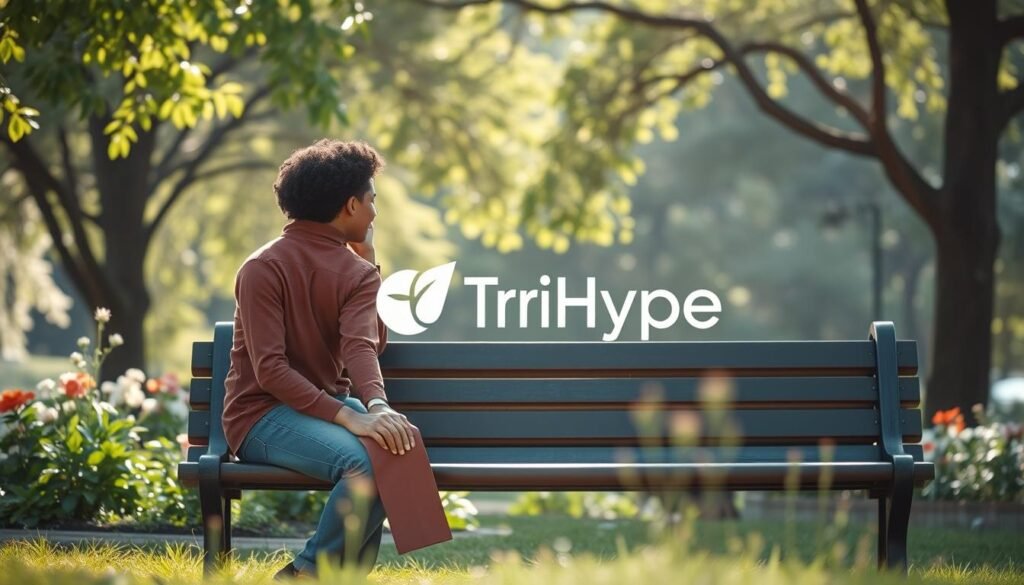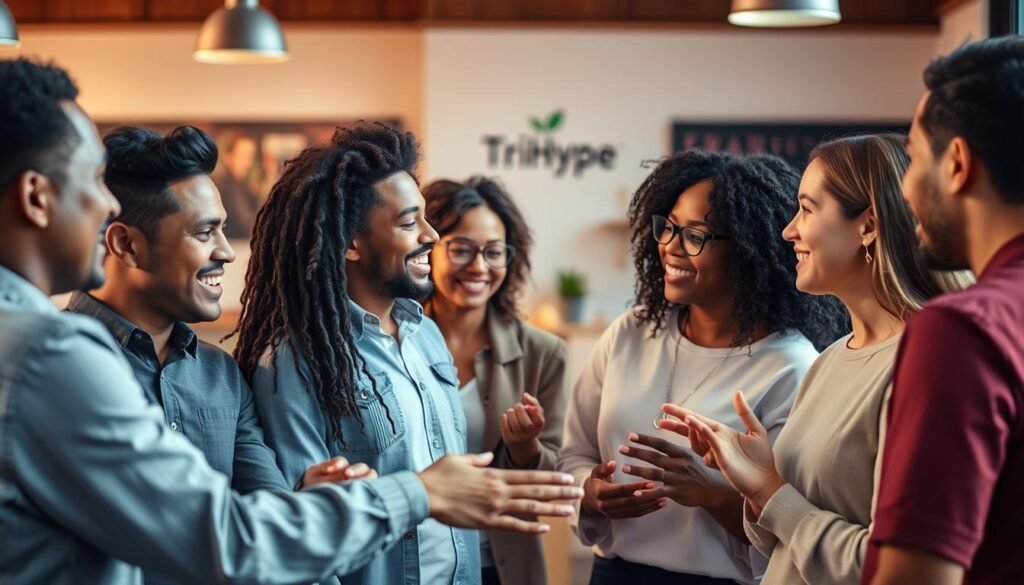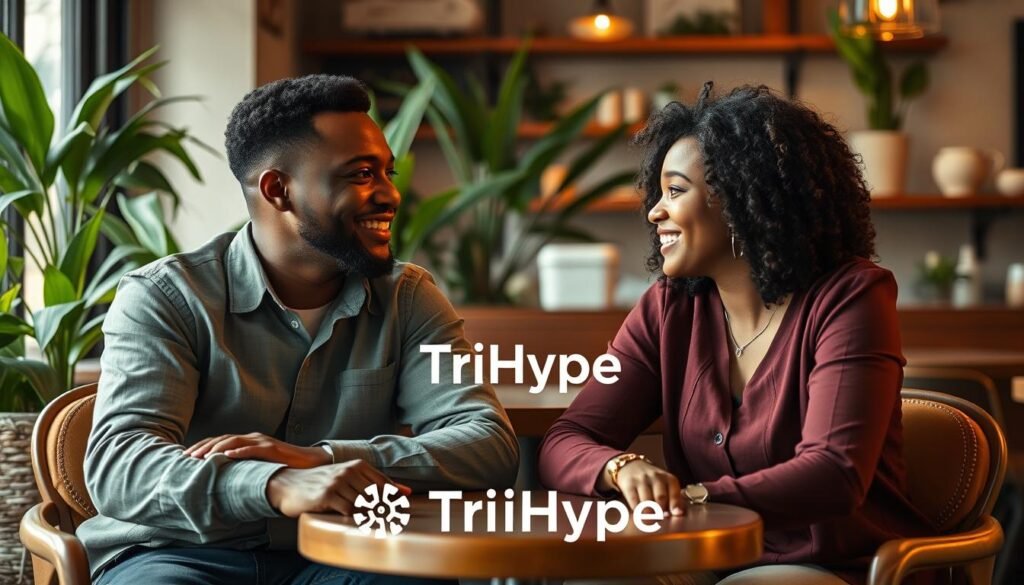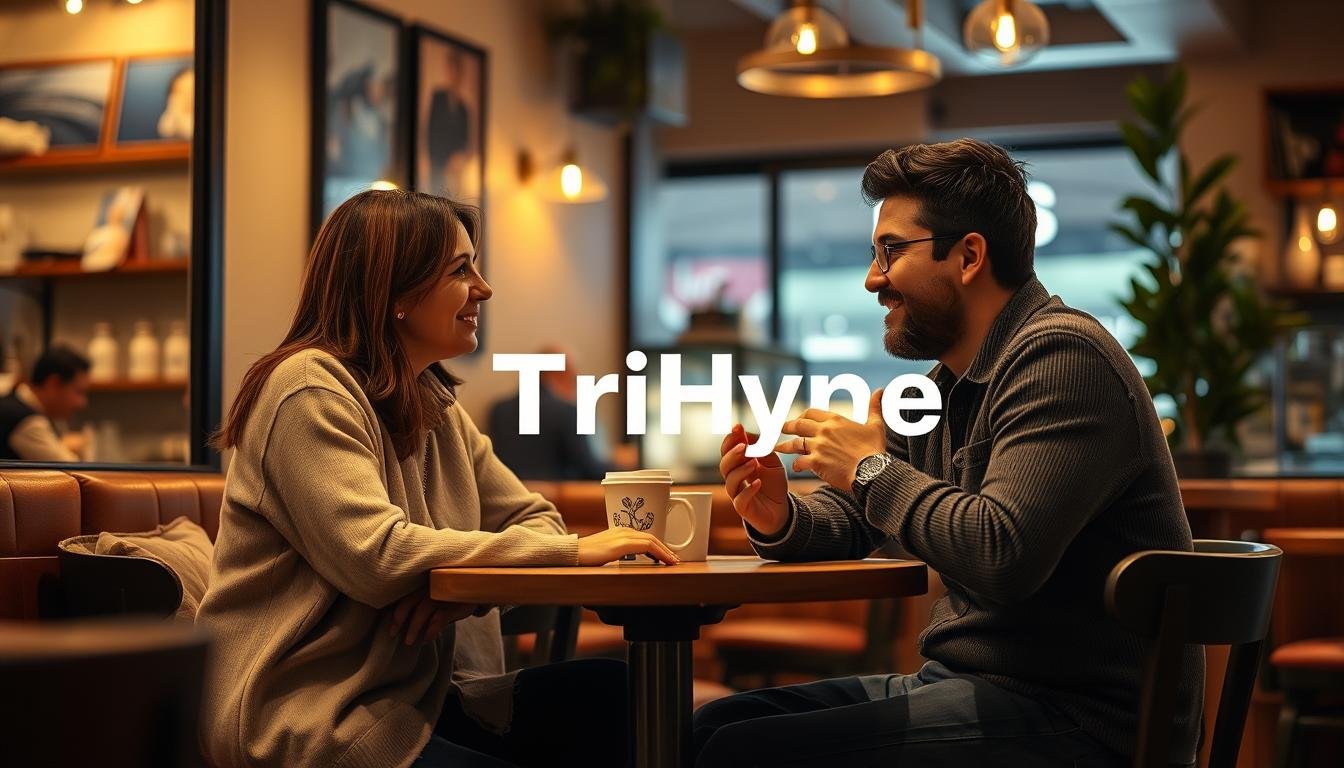Did you know a minute of eye contact can bond stronger than an hour of small talk? Building rapport is key in making connections and opening new doors. We’ll look at how to build rapport in daily chats, whether it’s with friends or colleagues.
Good communication is the base of any strong relationship. Rapport-building is at the heart of this. It helps us connect better, handle tough situations, and make the most of our interactions.
Key Takeaways
- Understand the power of active listening and open-ended questions in building rapport
- Learn the importance of mirroring body language to establish nonverbal rapport
- Discover how to find common ground and show empathy to foster deeper connections
- Explore the role of inclusive language in creating a welcoming environment
- Recognize the significance of maintaining trust and consistency in building lasting rapport
Introduction: The Power of Connecting with Others
Effective communication and building rapport are key in our lives. When we establish a connection, trust and collaboration grow. This article will show you how to build rapport in conversations and deepen connections.
Connecting with others is a basic human need. We feel good when we’re understood and valued. By building rapport, we create a space of mutual respect and understanding.
In job interviews, team meetings, or casual chats, connecting well matters a lot. When we build rapport, trust and understanding start. This can lead to lasting, rewarding connections.

“The most important thing in communication is to hear what isn’t being said.” – Peter Drucker
We’ll explore strategies for building rapport in conversations next. This includes active listening, mirroring body language, and finding common ground. By learning these skills, you can enhance your ability to connect with others and build meaningful relationships.
Active Listening: The Foundation of Building Rapport
Effective communication is key to building strong rapport with others. At its core is active listening, which means fully engaging with the speaker. It shows we’re really interested in what they have to say.
By keeping eye contact and asking open-ended questions, we make it easy for others to share. This builds trust and connection.
Maintaining Eye Contact: Showing Genuine Interest
Making eye contact shows we’re really listening. It tells the speaker we’re focused on understanding them. This simple action helps build rapport and makes the other person feel valued.
Asking Open-Ended Questions: Encouraging Conversation
- Open-ended questions, like “What was that like for you?” or “Can you tell me more about that?”, let the speaker share more.
- These questions help the other person open up, sharing their thoughts and feelings.
- By listening actively and asking thoughtful questions, we show we care about their view. This makes them feel comfortable sharing.
Active listening, with eye contact and open-ended questions, is the base for lasting rapport. It builds trust, empathy, and connection. These are key for better personal and professional relationships.
| Active Listening Techniques | Benefits |
|---|---|
| Maintaining Eye Contact | Conveys attentiveness and interest |
| Asking Open-Ended Questions | Encourages the speaker to share more |
| Paraphrasing and Summarizing | Demonstrates understanding and engagement |
| Showing Empathy and Validation | Fosters a sense of trust and connection |
Mirroring Body Language: Establishing Nonverbal Rapport
Our body language is key in building strong connections. By mirroring the body language of the person we’re talking to, we create a sense of togetherness. This makes the other person feel more comfortable and connected to us.
When we mirror someone’s posture, gestures, and voice, we show we’re in sync with them. This subtle mirroring makes the other person feel understood and valued. It opens the door for a more open and trusting conversation.

But, it’s important to find the right balance. Too much mirroring can seem unnatural or even manipulative. The goal is to mirror subtly, naturally, and with a true desire to connect.
By paying attention to the nonverbal cues of our conversation partners and mirroring them, we build rapport. This skill is valuable in both personal and professional settings. It helps us create deeper, more meaningful connections.
Finding Common Ground: Building Rapport in Conversations
Building rapport with others is key in many areas of life. Finding common ground is a great way to do this. It means looking for shared interests, experiences, or cultural backgrounds. This helps us understand each other better and build stronger relationships.
Shared Interests and Experiences
Talking becomes easier when we find things we both enjoy. It could be a favorite sport, music, or childhood memories. These common interests help us connect on a deeper level.
By exploring these similarities, we lay a strong foundation for rapport. It makes our conversations more meaningful.
Cultural Awareness and Sensitivity
In today’s diverse world, understanding different cultures is crucial. Learning about customs and traditions shows respect for others’ backgrounds. It helps us avoid misunderstandings and shows we’re open to learning.
Embracing cultural diversity opens up new ways to connect. It helps us find common ground and build genuine relationships.
By focusing on finding common ground, shared interests and experiences, and cultural awareness and sensitivity, we improve our rapport. This approach leads to more rewarding relationships in all areas of life.

Showing Empathy: Understanding Others’ Perspectives
Demonstrating empathy is key to building real connections. It means we can understand and share others’ feelings. This creates a space of trust and mutual understanding.
Empathy is more than just knowing someone’s emotions. It’s about seeing the world from their point of view. By letting go of our own biases, we learn about their unique experiences and challenges.

There are many ways to show empathy. We can validate someone’s feelings or just listen without judgment. Being present and genuinely interested in their story shows we care. This builds a strong emotional bond and trust.
Empathy is not just a soft skill; it’s essential for good communication and building relationships. It helps us navigate conversations with care, find common ground, and form deeper connections.
| Benefit | Description |
|---|---|
| Builds Trust | Demonstrating empathy shows you genuinely care, building trust and openness. |
| Enhances Collaboration | Understanding different perspectives leads to better problem-solving and collaboration. |
| Improves Relationships | Showing respect for others’ experiences strengthens connections. |
Mastering empathy is a valuable skill for personal and professional growth. It leads to more productive and fulfilling interactions. By understanding and showing genuine care, we build rapport and a sense of belonging.
Using Inclusive Language: Fostering a Welcoming Environment
Creating a welcoming and inclusive environment is key for building strong rapport. By using language that celebrates diversity, we make a space where people feel free to be themselves. This allows for open and honest conversations.
Using the right terms is important. Avoiding gendered pronouns and using people-first language helps everyone feel included. Learning the preferred terms in different communities shows respect and sensitivity.
It’s also crucial to address unconscious biases. We all have biases that affect how we see and interact with others. By recognizing these biases and striving to be more inclusive, we create a welcoming space for everyone.
Using inclusive language is more than just being correct; it’s about making everyone feel valued. This approach helps us build stronger connections and deepen our rapport with others.
| Inclusive Language | Non-Inclusive Language |
|---|---|
| Spouse, partner | Husband, wife |
| Humanity, people | Mankind |
| Wheelchair user | Disabled person |
| Person of color | Colored person |
By adopting inclusive language, we make conversations more welcoming. This leads to deeper connections and stronger rapport.

“Inclusive language is not about being politically correct; it’s about creating a space where everyone feels valued and respected.”
Building Rapport in Conversations: Cultivating Trust
Building trust is key to strong relationships, including in conversations. Showing consistency, honesty, and respect for boundaries helps create a trustful environment. This leads to better rapport and communication.
Consistency and Honesty
Being consistent is crucial for trust. Being reliable and keeping promises shows we can be counted on. Honesty also builds trust by showing our integrity. Being open and truthful makes our interactions authentic and open.
Respecting Boundaries and Privacy
Respecting personal space and privacy is vital for trust. Paying attention to others’ comfort and giving them space shows we value their freedom. This builds a secure and understanding relationship, essential for strong rapport.
| Rapport-Building Strategy | Description | Importance |
|---|---|---|
| Consistency | Being reliable, predictable, and following through on words and actions. | Demonstrates trustworthiness and reliability. |
| Honesty | Being transparent and truthful in interactions. | Establishes integrity and authenticity. |
| Respecting Boundaries and Privacy | Being mindful of the other person’s comfort level and giving them the space they need. | Signals respect for autonomy and creates a sense of security. |
By focusing on trust, we can make our conversations more meaningful. This leads to more productive and rewarding interactions.

“Trust is the glue of life. It’s the most essential ingredient in effective communication. It’s the foundational principle that holds all relationships.” – Stephen Covey
Remembering Key Details: Demonstrating Attentiveness
Building rapport is easier when you remember important details about the person you’re talking to. When you recall their interests, experiences, or milestones, it shows you were really listening. It also shows you genuinely care about their well-being.
Showing you pay attention can make a big difference. It makes the other person feel valued and respected. It tells them you see them as an individual, not just another face. By remembering key details, you build a stronger connection and trust.
Remembering a shared hobby, an event they mentioned, or a personal detail they shared shows you’re attentive. This simple act can greatly improve your rapport and strengthen your relationship. It proves you listen and care about their thoughts and feelings.
“The most important thing in communication is to hear what isn’t being said.” – Peter Drucker
By remembering key details and demonstrating attentiveness, you build rapport and show you’re fully present. This trust and understanding can lead to better collaborations, deeper connections, and more opportunities for growth.
| Benefit | Description |
|---|---|
| Builds Trust | Recalling and referencing key details about someone shows that you were listening and care about their experiences. |
| Enhances Rapport | Demonstrating attentiveness makes the other person feel valued and respected, strengthening the connection. |
| Fosters Meaningful Connections | By remembering important details, you can have more personalized and engaging conversations. |
The Art of Small Talk: Initiating Rapport
Starting a casual conversation, or small talk, is a great way to connect with others. Talking about everyday things or shared experiences helps us get started. It’s a way to ease into deeper talks.
Even though small talk might seem simple, it’s crucial in social interactions. It helps us feel more at ease and find common interests. Initiating rapport through small talk is especially useful in work settings or when meeting new people.
- Start with open-ended questions: Ask about the other person’s day, weekend plans, or interests to encourage conversation.
- Comment on the environment: Remark on the weather, the decor, or a nearby event to establish a shared reference point.
- Bring up current events or popular culture: Discuss a recent news story or a trending TV show to connect over shared experiences.
- Share a brief personal anecdote: Offer a lighthearted story or observation to help the other person get to know you better.
The secret to good small talk is to keep it light and positive. Show genuine interest and share relevant info. This way, we can build a rapport that opens doors to deeper conversations.
“Small talk is the social lubricant that helps us connect with others and establish a foundation for deeper relationships.”
At first, small talk might feel awkward. But with practice, it becomes a key tool for initiating rapport and building connections with others.
Building Rapport in Professional Settings
Building rapport is key in both personal and professional life. It’s vital for [a href=”https://www.acuitymd.com/blog/relationship-building-11-easy-ways-to-build-rapport”]cultivating client relationships[/a] and [a href=”https://www.acuitymd.com/blog/relationship-building-11-easy-ways-to-build-rapport”]team dynamics[/a]. Skills like active listening, finding common ground, and empathy are crucial in the workplace.
Client Relationships
Strong rapport with clients is vital for trust and communication. By [a href=”https://www.acuitymd.com/blog/relationship-building-11-easy-ways-to-build-rapport”]showing genuine interest in their needs[/a], listening well, and [a href=”https://www.acuitymd.com/blog/relationship-building-11-easy-ways-to-build-rapport”]finding common interests[/a], we build a strong connection.
Team Dynamics
Good rapport in a team boosts collaboration and communication. It creates a space of trust, empathy, and understanding. This leads to a more cohesive and productive team.
Building rapport in work settings can [a href=”https://www.acuitymd.com/blog/relationship-building-11-easy-ways-to-build-rapport”]increase satisfaction and success[/a]. It helps us grow personally and professionally. By honing these skills, we make our work more rewarding.
Cross-Cultural Rapport: Bridging Divides
In today’s global world, it’s key to build strong cross-cultural rapport. By showing cultural awareness, valuing differences, and seeing our common humanity, we can bridge divides. This way, we can make real connections with people from all walks of life.
To start building cross-cultural rapport, we need to be open and curious. We should be eager to learn about customs, beliefs, and views that are different from ours. This curiosity helps us understand and empathize, creating a base for real talks.
- Educate yourself about the cultural norms and etiquette of those you interact with.
- Ask thoughtful questions to gain insights, but avoid assumptions or stereotypes.
- Adapt your communication style to resonate with diverse audiences.
Cultural awareness goes beyond just noticing differences. It’s about seeing our shared dreams, hopes, and struggles as humans. By focusing on these commonalities, we can bridge divides and find common ground. This builds a sense of connection and understanding.
“The most important thing in communication is to hear what isn’t being said.” – Peter Drucker
Building cross-cultural rapport is a powerful way to break down barriers and build strong relationships. By embracing diversity and focusing on our shared humanity, we can make our world more inclusive and connected.
The Long-Term Benefits of Rapport
Spending time to build rapport in our talks can bring many long-term benefits. It helps us make deeper meaningful connections. This can make our personal and work relationships better, build trust, and improve our life quality.
By focusing on genuine rapport, we unlock many positive effects. These can change our lives for the better. They help us strengthen our interpersonal relationships and boost our professional success. The benefits of rapport are truly priceless.
- Strengthened Interpersonal Relationships: Building meaningful connections with others can make our personal ties stronger. It increases trust and makes us feel more connected. This can make our relationships more fulfilling and improve our emotional health.
- Enhanced Professional Success: At work, rapport-building leads to better teamwork, trust, and communication. This can improve our relationships with colleagues, enhance teamwork, and lead to greater success in our careers.
- Increased Empathy and Understanding: Investing in building rapport helps us understand others better. This empathy makes our relationships more compassionate and inclusive. It creates a more harmonious and fulfilling social environment.
“The quality of our relationships determines the quality of our lives.” – Anthony Robbins
By understanding the long-term benefits of rapport, we can work on making meaningful connections. This improves our overall well-being. Through listening, finding common interests, and showing genuine care, we can use rapport to make our lives better.
Mastering Persuasive Communication Tactics
Conclusion: Fostering Meaningful Connections
Looking back, we see that building rapport and trust is key. It’s important in both our personal and work lives. By listening well, mirroring body language, and showing real empathy, we help trust grow.
The knowledge we’ve gained helps us build strong, caring relationships. This is true whether we’re working with clients or team members. Being able to connect and trust others boosts teamwork, productivity, and happiness.
Let’s keep growing by focusing on meaningful connections through good communication. By improving these skills, we open doors to new chances, strengthen bonds, and help make the world a better place.
